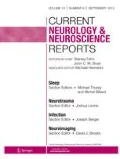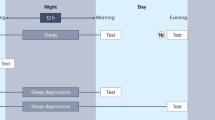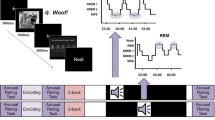Abstract
Sleep benefits memory consolidation. Previous theoretical accounts have proposed a differential role of slow-wave sleep (SWS), rapid-eye-movement (REM) sleep, and stage N2 sleep for different types of memories. For example the dual process hypothesis proposes that SWS is beneficial for declarative memories, whereas REM sleep is important for consolidation of non-declarative, procedural and emotional memories. In fact, numerous recent studies do provide further support for the crucial role of SWS (or non-REM sleep) in declarative memory consolidation. However, recent evidence for the benefit of REM sleep for non-declarative memories is rather scarce. In contrast, several recent studies have related consolidation of procedural memories (and some also emotional memories) to SWS (or non-REM sleep)-dependent consolidation processes. We will review this recent evidence, and propose future research questions to advance our understanding of the role of different sleep stages for memory consolidation.

Similar content being viewed by others
References
Papers of particular interest, published recently, have been highlighted as: •• Of major importance
Rasch B, Born J. About sleep’s role in memory. Physiol Rev. 2013;93:681–766. A comprehensive review on the curent status of sleep and memory research.
Diekelmann S, Born J. The memory function of sleep. Nat Rev Neurosci. 2010;11:114–26.
Marshall L, Born J. The contribution of sleep to hippocampus-dependent memory consolidation. Trends Cogn Sci. 2007;11:442–50.
Born J, Wilhelm I. System consolidation of memory during sleep. Psychol Res. 2012;76:192–203.
Mölle M, Marshall L, Gais S, Born J. Learning increases human electroencephalographic coherence during subsequent slow sleep oscillations. Proc Natl Acad Sci U S A. 2004;101:13963–8.
Menicucci D, Piarulli A, Debarnot U, d’Ascanio P, Landi A, Gemignani A. Functional structure of spontaneous sleep slow oscillation activity in humans. PLoS One. 2009;4:e7601.
Mölle M, Born J. Slow oscillations orchestrating fast oscillations and memory consolidation. Prog Brain Res. 2011;193:93–110.
Cantero JL, Atienza M, Stickgold R, Kahana MJ, Madsen JR, Kocsis B. Sleep-dependent theta oscillations in the human hippocampus and neocortex. J Neurosci. 2003;23:10897–903.
Buzsáki G. Theta oscillations in the hippocampus. Neuron. 2002;33:325–40.
Smith CT. Sleep states and memory processes in humans: procedural versus declarative memory systems. Sleep Med Rev. 2001;5:491–506.
Plihal W, Born J. Effects of early and late nocturnal sleep on declarative and procedural memory. J Cogn Neurosci. 1997;9:534–47.
Wagner U, Gais S, Born J. Emotional memory formation is enhanced across sleep intervals with high amounts of rapid eye movement sleep. Learn Mem. 2001;8:112–9.
Squire LR. Memory systems of the brain: A brief history and current perspective. Neurobiol Learn Mem. 2004;82:171–7.
Rauchs G, Desgranges B, Foret J, Eustache F. The relationships between memory systems and sleep stages. J Sleep Res. 2005;14:123–40.
Walker MP, Stickgold R. Sleep-dependent learning and memory consolidation. Neuron. 2004;44:121–33.
Tononi G, Cirelli C. Sleep function and synaptic homeostasis. Sleep Med Rev. 2006;10:49–62.
Oudiette D, Paller K A. Upgrading the sleeping brain with targeted memory reactivation. Trends Cogn Sci. 2013;1–8.
Rasch B, Buchel C, Gais S, Born J. Odor cues during slow-wave sleep prompt declarative memory consolidation. Science. 2007;315:1426–9.
Rudoy JD, Voss JL, Westerberg CE, Paller KA. Strengthening individual memories by reactivating them during sleep. Science. 2009;326:1079. The authors show that reactivation can selectively enhance memory consolidation. Spatial locations of items in an object-location task that are cued (sound) during a post-learning nap are less often forgotten than locations of uncued items.
Schönauer M, Geisler T, Gais S. Strengthening procedural memories by reactivation in sleep. J Cogn Neurosci. 2013;1–11. The study shows that auditory reactivation during early sleep strenghtens procedural memory consolidation (finger-tapping task) during sleep, but not during wakefulness. The benefit is selective for cued sequences.
Antony JW, Gobel EW, O’Hare JK, Reber PJ, Paller KA. Cued memory reactivation during sleep influences skill learning. Nat Neurosci. 2012;15:1114–6. Auditory reactivation of procedural memory during SWS of an afternoon nap improved accuracy in after sleep memory performance showing a role of SWS for consolidation of procedural memory.
Hauner KK, Howard JD, Zelano C, Gottfried JA. Stimulus-specific enhancement of fear extinction during slow-wave sleep. Nat Neurosci. 2013;16:1553–5. The authors show that in humans, memories that are reactivated during SWS elicit a smaller fear response when cues are again presented during wake (smaller skin conductance response). This study is in contrast with a recent study in mice showing that consolidation of fear memories during sleep is strengthened [97].
Gais S, Born J. Declarative memory consolidation: mechanisms acting during human sleep. Learn Mem. 2004;11:679–85.
Yaroush R, Sullivan MJ, Ekstrand BR. Effect of sleep on memory. II. Differential effect of the first and second half of the night. J Exp Psychol. 1971;88:361–6.
Fowler MJ, Sullivan MJ, Ekstrand BR. Sleep and memory. Science. 1973;179.
Barrett TR, Ekstrand BR. Effect of sleep on memory: III. Controlling for time-of-day effects. J Exp Psychol. 1972;96:321–7.
Plihal W, Born J. Effects of early and late nocturnal sleep on priming and spatial memory. Psychophysiology. 1999;36:571–82.
Verleger R, Schuknecht S-V, Jaśkowski P, Wagner U. Changes in processing of masked stimuli across early- and late-night sleep: a study on behavior and brain potentials. Brain Cogn. 2008;68:180–92.
Wagner U, Hallschmid M, Verleger R, Born J. Signs of REM sleep dependent enhancement of implicit face memory: a repetition priming study. Biol Psychol. 2002;62.
Wagner U, Fischer S, Born J. Changes in emotional responses to aversive pictures across periods rich in slow-wave sleep versus rapid eye movement sleep. Psychosom Med. 2002;64:627–34.
Groch S, Wilhelm I, Diekelmann S, Born J. The role of REM sleep in the processing of emotional memories: evidence from behavior and event-related potentials. Neurobiol Learn Mem. 2013;99:1–9.
Smith CT, MacNeill C. Impaired motor memory for a pursuit rotor task following Stage 2 sleep loss in college students. J Sleep Res. 1994;3:206–13.
Smith CT. Sleep states, memory processes and synaptic plasticity. Behav Brain Res. 1996;78:49–56.
Smith CT. Sleep states and memory processes. Behav Brain Res. 1995;69:137–45.
Alger SE, Lau H, Fishbein W. Slow wave sleep during a daytime nap is necessary for protection from subsequent interference and long-term retention. Neurobiol Learn Mem. 2012;98:188–96.
Diekelmann S, Biggel S, Rasch B, Born J. Offline consolidation of memory varies with time in slow wave sleep and can be accelerated by cuing memory reactivations. Neurobiol Learn Mem. 2012;98:103–11. This study shows that reactivation can boost the beneficial effect of sleep on memory consolidation. While a 40-min nap without reactivation does not benefit memory as compared to wakefulness, a nap of 40 minutes with reactivation led to the same consolidation benefit as a 90-min nap without reactivation. External reactivation leads to faster consolidation and may compensate for less SWS.
Alger SE, Lau H, Fishbein W. Delayed onset of a daytime nap facilitates retention of declarative memory. PLoS One. 2010;5:e12131.
Mander BA, Rao V, Lu B, Saletin JM, Lindquist JR, Ancoli-Israel S, et al. Prefrontal atrophy, disrupted NREM slow waves and impaired hippocampal-dependent memory in aging. Nat Neurosci. 2013;1–10.
Scullin MK. Sleep, memory, and aging: the link between slow-wave sleep and episodic memory changes from younger to older adults. Psychol Aging. 2013;28:105–14.
Piosczyk H, Holz J, Feige B, Spiegelhalder K, Weber F, Landmann N, et al. The effect of sleep-specific brain activity versus reduced stimulus interference on declarative memory consolidation. J Sleep Res. 2013;22:406–13.
Tamminen J, Payne JD, Stickgold R, Wamsley EJ, Gaskell MG. Sleep spindle activity is associated with the integration of new memories and existing knowledge. J Neurosci. 2010;30:14356–60.
Tamminen J, Lambon Ralph MA, Lewis PA. The role of sleep spindles and slow-wave activity in integrating new information in semantic memory. J Neurosci. 2013;33:15376–81.
Kurdziel L, Duclos K, Spencer RMC. Sleep spindles in midday naps enhance learning in preschool children. Proc Natl Acad Sci U S A. 2013;110:17627–72.
Marshall L, Helgadottir H, Mölle M, Born J. Boosting slow oscillations during sleep potentiates memory. Nature. 2006;444:610–3.
Eggert T, Dorn H, Sauter C, Nitsche MA, Bajbouj M, Danker-Hopfe H. No effects of slow oscillatory transcranial direct current stimulation (tDCS) on sleep-dependent memory consolidation in healthy elderly subjects. Brain Stimul. 2013;6:938–45.
Marshall L, Kirov R, Brade J, Mölle M, Born J. Transcranial electrical currents to probe EEG brain rhythms and memory consolidation during sleep in humans. PLoS One. 2011;6:e16905.
Antonenko D, Diekelmann S, Olsen C, Born J, Mölle M. Napping to renew learning capacity: enhanced encoding after stimulation of sleep slow oscillations. Eur J Neurosci. 2013;37:1142–51.
Van Der Werf YD, Altena E, Schoonheim MM, Sanz-Arigita EJ, Vis JC, De Rijke W, et al. Sleep benefits subsequent hippocampal functioning. Nat Neurosci. 2009;12:122–3.
Van Der Werf YD, Altena E, Vis JC, Koene T, Van Someren EJW. Reduction of nocturnal slow-wave activity affects daytime vigilance lapses and memory encoding but not reaction time or implicit learning. Prog Brain Res. 2011;193:245–55.
Ngo H-VV, Martinetz T, Born J, Mölle M. Auditory closed-loop stimulation of the sleep slow oscillation enhances memory. Neuron. 2013;78:545–53.
O’Neill J, Pleydell-Bouverie B, Dupret D, Csicsvari J. Play it again: reactivation of waking experience and memory. Trends Neurosci. 2010;33:220–9.
Fuentemilla L, Miró J, Ripollés P, Vilà-Balló A, Juncadella M, Castañer S, et al. Hippocampus-dependent strengthening of targeted memories via reactivation during sleep in humans. Curr Biol. 2013;23:1769–75. This study shows that hippocampal activity is crucial for beneficial effects of reactivation on memory consolidation.The authors compared effects of external reactivation cues (sounds) during SWS on memory consolidation in healthy individuals and epileptic patients with unilateral and bilateral hippocampal sclerosis. External reactivation during sleep only benefited memory in healthy individuals and epileptic patients with unilateral hippocampal sclerosis.
Oudiette D, Antony JW, Creery JD, Paller KA. The role of memory reactivation during wakefulness and sleep in determining which memories endure. J Neurosci. 2013;33:6672–8.
Diekelmann S, Büchel C, Born J, Rasch B. Labile or stable: opposing consequences for memory when reactivated during waking and sleep. Nat Neurosci. 2011;14:381–6. The authors investigated differential effects of reactivation during waking and sleep. Interestingly, reactivation of memory during wake leads to destabilization of memory while reactivation of memory during sleep leads to stabilization of memory. Morevoer, REM sleep does not seem to be necessary for stabilization of memory, as also reactivation during a period of SWS sleep not containing REM sleep leads to stabilization of memory.
Lüthi A. Sleep spindles: where they come from, what they do. Neuroscientist. 2013 Aug 27 [Epub ahead of print].
Cox R, Hofman WF, Talamini LM. Involvement of spindles in memory consolidation is slow wave sleep-specific. Learn Mem. 2012;19:264–7.
Ruch S, Markes O, Duss SB, Oppliger D, Reber TP, Koenig T, et al. Sleep stage II contributes to the consolidation of declarative memories. Neuropsychologia. 2012;50:2389–96.
Mednick SC, McDevitt EA, Walsh JK, Wamsley E, Paulus M, Kanady JC, et al. The critical role of sleep spindles in hippocampal-dependent memory: a pharmacology study. J Neurosci. 2013;33:4494–504.
Feld GB, Wilhelm I, Ma Y, Groch S, Binkofski F, Mölle M, et al. Slow wave sleep induced by GABA agonist tiagabine fails to benefit memory consolidation. Sleep. 2013;36:1317–26.
Albouy G, King BR, Maquet P, Doyon J. Hippocampus and striatum: Dynamics and interaction during acquisition and sleep-related motor sequence memory consolidation. Hippocampus. 2013;23:985–1004.
Peigneux P, Laureys S, Delbeuck X, Maquet P. Sleeping brain, learning brain. The role of sleep for memory systems. Neuroreport. 2001;12:A111–24.
Fischer S, Hallschmid M, Elsner AL, Born J. Sleep forms memory for finger skills. Proc Natl Acad Sci U S A. 2002;99:11987–91.
Fischer S, Nitschke MF, Melchert UH, Erdmann C, Born J. Motor memory consolidation in sleep shapes more effective neuronal representations. J Neurosci. 2005;25:11248–55.
Rasch B, Gais S, Born J. Impaired off-line consolidation of motor memories after combined blockade of cholinergic receptors during REM sleep-rich sleep. Neuropsychopharmacology. 2009;34:1843–53.
Rasch B, Pommer J, Diekelmann S, Born J. Pharmacological REM sleep suppression paradoxically improves rather than impairs skill memory. Nat Neurosci. 2009;12:396–7.
Siegel JM. The REM, sleep-memory consolidation hypothesis. Science. 2001;294:1058–63.
Vertes RP, Eastman KE. The case against memory consolidation in REM sleep. Behav Brain Sci. 2000;23:867–76.
Walker MP, Brakefield T, Morgan A, Hobson JA, Stickgold R. Practice with sleep makes perfect: sleep-dependent motor skill learning. Neuron. 2002;35:205–11.
Nishida M, Walker MP. Daytime naps, motor memory consolidation and regionally specific sleep spindles. PLoS One. 2007;2:e341.
Fogel SM, Smith CT, Cote KA. Dissociable learning-dependent changes in REM and non-REM sleep in declarative and procedural memory systems. Behav Brain Res. 2007;180:48–61.
Huber R, Ghilardi MF, Massimini M, Tononi G. Local sleep and learning. Nature. 2004;430:78–81.
Huber R, Ghilardi MF, Massimini M, Ferrarelli F, Riedner BA, Peterson MJ, et al. Arm immobilization causes cortical plastic changes and locally decreases sleep slow wave activity. Nat Neurosci. 2006;9:1169–76.
Aeschbach D, Cutler AJ, Ronda JM. A role for non-rapid-eye-movement sleep homeostasis in perceptual learning. J Neurosci. 2008;28:2766–72.
Landsness EC, Crupi D, Hulse BK, Peterson MJ, Huber R, Ansari H, et al. Sleep-dependent improvement in visuomotor learning: a causal role for slow waves. Sleep. 2009;32:1273–84. Acoustic suppression of slow wave activity diminished overnight improvement in a visuomotor learning task as compared to a control group. These results demonstrate the importance of slow wave activity for the formation of procedural memory.
Born J, Gais S. REM sleep deprivation: The wrong paradigm leading to wrong conclusions. Behav Brain Sci. 2000;23:912–3.
Albouy G, Sterpenich V, Vandewalle G, Darsaud A, Gais S, Rauchs G, et al. Interaction between hippocampal and striatal systems predicts subsequent consolidation of motor sequence memory. PLoS One. 2013;8:e59490.
McGaugh JL. The amygdala modulates the consolidation of memories of emotionally arousing experiences. Annu Rev Neurosci. 2004;27:1–28.
Hu P, Stylos-Allan M, Walker MP. Sleep facilitates consolidation of emotional declarative memory. Psychol Sci. 2006;17:891–8.
Payne JD, Kensinger EA. Sleep’s role in the consolidation of emotional episodic memories. Curr Dir Psychol Sci. 2010;19:290–5.
Wagner U, Hallschmid M, Rasch B, Born J. Brief sleep after learning keeps emotional memories alive for years. Biol Psychiatry. 2006;60:788–90.
Hennevin E, Huetz C, Edeline J-M. Neural representations during sleep: from sensory processing to memory traces. Neurobiol Learn Mem. 2007;87:416–40.
Freud S. The interpretation of dreams. 1900.
Hobson JA, Pace-Schott EF. The cognitive neuroscience of sleep: neuronal systems, consciousness and learning. Nat Rev Neurosci. 2002;3:679–93.
Tsuno N, Besset A, Ritchie K. Sleep and depression. J Clin Psychiatry. 2005;66:1254–69.
Walker MP. The role of sleep in cognition and emotion. Ann N Y Acad Sci. 2009;1156:168–97.
Walker MP, van der Helm E. Overnight therapy? The role of sleep in emotional brain processing. Psychol Bull. 2009;135:731–48. An important review proposing that a role of sleep for emotional memory proessing is twofold: while the emotional context ist strengthened by sleep, the associated emotion of the memory is reduced.
Nishida M, Pearsall J, Buckner RL, Walker MP. REM sleep, prefrontal theta, and the consolidation of human emotional memory. Cereb Cortex. 2009;19:1158–66.
Menz MM, Rihm JS, Salari N, Born J, Kalisch R, Pape HCC, et al. The role of sleep and sleep deprivation in consolidating fear memories. Neuroimage. 2013;75:87–96.
Van der Helm E, Yao J, Dutt S, Rao V, Saletin JM, Walker MP. REM sleep depotentiates amygdala activity to previous emotional experiences. Curr Biol. 2011;21:2029–32.
Gujar N, McDonald SA, Nishida M, Walker MP. A role for REM sleep in recalibrating the sensitivity of the human brain to specific emotions. Cereb Cortex. 2011;21:115–23.
Baran B, Pace-Schott EF, Ericson C, Spencer RM. Processing of emotional reactivity and emotional memory over sleep. J Neurosci. 2012;32:1035–42.
Deliens G, Neu D, Peigneux P. Rapid eye movement sleep does not seem to unbind memories from their emotional context. J Sleep Res. 2013;36:1875–83.
Groch S, Wilhelm I, Diekelmann S, Sayk F, Gais S, Born J. Contribution of norepinephrine to emotional memory consolidation during sleep. Psychoneuroendocrinology. 2011;36:1342–50.
Kaestner EJ, Wixted JT, Mednick SC. Pharmacologically increasing sleep spindles enhances recognition for negative and high-arousal memories. J Cogn Neurosci 2013;1597–610.
Hars B, Hennevin E. Impairment of learning by cueing during postlearning slow-wave sleep in rats. Neurosci Lett. 1987;79:290–4.
Hennevin E, Hars B. Is increase in post-learning paradoxical sleep modified by cueing? Behav Brain Res. 1987;24:243–9.
Rolls A, Makam M, Kroeger D, Colas D, de Lecea L, Heller HC. Sleep to forget: interference of fear memories during sleep. Mol Psychiatry. 2013;18:1166–70. Reactivating fear memories during non-REM sleep in mice using an odor conditioning paradigm, leads to stronger consolidation of fear memories during sleep. This effect depends on protein synthesis in the basolateral amygdala. These results are in contrast with a study of fear consolidation during sleep in humans [21].
Stickgold R. Parsing the role of sleep in memory processing. Curr Opin Neurobiol. 2013;23:847–53.
Ficca G, Salzarulo P. What in sleep is for memory. Sleep Med. 2004;5:225–30.
Stickgold R, Walker MP. Sleep-dependent memory triage: evolving generalization through selective processing. Nat Neurosci. 2013;16:139–45.
Rauchs G, Feyers D, Landeau B, Bastin C, Luxen A, Maquet P, et al. Sleep contributes to the strengthening of some memories over others, depending on hippocampal activity at learning. J Neurosci. 2011;31:2563–8.
Saletin JM, Goldstein AN, Walker MP. The role of sleep in directed forgetting and remembering of human memories. Cereb Cortex. 2011;21:2534–41.
Wilhelm I, Diekelmann S, Molzow I, Ayoub A, Mo M, Born J. Sleep selectively enhances memory expected to be of future relevance. J Neurosci. 2011;31:1563–9.
Diekelmann S, Wilhelm I, Wagner U, Born J. Sleep to implement an intention. Sleep. 2013;36:149–53.
Acknowledgments
This work was supported by grants from the Swiss National Foundation (SNF) (PP00P1_133685) and the University of Zürich (Clinical Research Priority Programm "Sleep and Health").
Compliance with Ethics Guidelines
ᅟ
Conflict of Interest
Sandra Ackermann received a grant from the University of Zurich Clinical research priority project “Sleep and Health”.
Björn Rasch received grants from the Swiss National Science Foundation (PP00P1_133685) and from the University of Zurich Clinical research priority project “Sleep and Health”.
Human and Animal Rights and Informed Consent
This article does not contain any studies with human or animal subjects performed by any of the authors.
Author information
Authors and Affiliations
Corresponding author
Additional information
This article is part of the Topical Collection on Sleep
Rights and permissions
About this article
Cite this article
Ackermann, S., Rasch, B. Differential Effects of Non-REM and REM Sleep on Memory Consolidation?. Curr Neurol Neurosci Rep 14, 430 (2014). https://doi.org/10.1007/s11910-013-0430-8
Published:
DOI: https://doi.org/10.1007/s11910-013-0430-8




